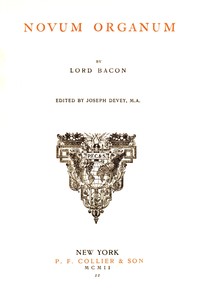Novum organum : or, True suggestions for the interpretation of nature by Bacon
"Novum Organum; Or, True Suggestions for the Interpretation of Nature" by Lord Bacon is a scientific publication written in the early 17th century. It serves as a foundational text for the modern scientific method, addressing how knowledge can be systematically acquired through careful observation and induction rather than through vestiges of past philosophical doctrines. The book critiques previous methodologies and sets forth Bacon's vision of a new approach to understanding nature. The
opening of the text lays the groundwork for Bacon's critique of both dogmatic and skeptical philosophies, arguing that both hinder true inquiry. He emphasizes the importance of a method that relies on empirical observation and induction rather than on established doctrines, showing how this approach would lead to greater advancements in knowledge. Bacon introduces the concept of "idols," or common misconceptions that obstruct the understanding, categorized into four types: idols of the tribe, the den, the market, and the theatre. This section establishes the foundation of his thinking, as he calls for a more rigorous, experimental pursuit of knowledge, one that engages directly with nature and its phenomena. (This is an automatically generated summary.)
Read or download for free
| How to read | Url | Size | |||
|---|---|---|---|---|---|
| Read now! | https://www.gutenberg.org/ebooks/45988.html.images | 636 kB | |||
| EPUB3 (E-readers incl. Send-to-Kindle) | https://www.gutenberg.org/ebooks/45988.epub3.images | 371 kB | |||
| EPUB (older E-readers) | https://www.gutenberg.org/ebooks/45988.epub.images | 378 kB | |||
| EPUB (no images, older E-readers) | https://www.gutenberg.org/ebooks/45988.epub.noimages | 286 kB | |||
| Kindle | https://www.gutenberg.org/ebooks/45988.kf8.images | 540 kB | |||
| older Kindles | https://www.gutenberg.org/ebooks/45988.kindle.images | 493 kB | |||
| Plain Text UTF-8 | https://www.gutenberg.org/ebooks/45988.txt.utf-8 | 555 kB | |||
| Download HTML (zip) | https://www.gutenberg.org/cache/epub/45988/pg45988-h.zip | 335 kB | |||
| There may be more files related to this item. | |||||
Similar Books
About this eBook
| Author | Bacon, Francis, 1561-1626 |
|---|---|
| Editor | Devey, Joseph, 1823-1897 |
| Title | Novum organum : or, True suggestions for the interpretation of nature |
| Credits | Jana Srna, Marie Bartolo, Bryan Ness and the Online Distributed Proofreading Team |
| Reading Level | Reading ease score: 43.2 (College-level). Difficult to read. |
| Language | English |
| LoC Class | B: Philosophy, Psychology, Religion |
| Subject | Science -- Methodology -- Early works to 1800 |
| Subject | Induction (Logic) -- Early works to 1800 |
| Category | Text |
| EBook-No. | 45988 |
| Release Date | Jun 15, 2014 |
| Most Recently Updated | Oct 24, 2024 |
| Copyright Status | Public domain in the USA. |
| Downloads | 1984 downloads in the last 30 days. |
| Project Gutenberg eBooks are always free! | |

